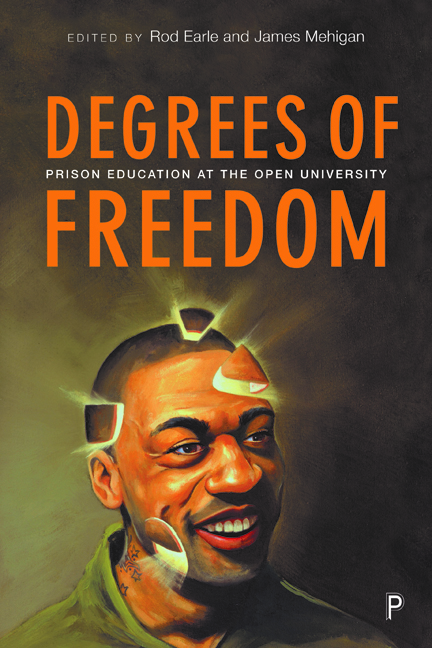Book contents
- Frontmatter
- Dedication
- Contents
- Notes on Contributors
- Acknowledgements
- 1 Openings and Introductions: Education for the Many, Prison for the Few
- 2 From Prisoner to Student
- Vignette 1 Choosing My Journey
- 3 Pioneers and Politics: Open University Journeys in Long Kesh During the Years of Conflict 1972–75
- Vignette 2 Avoiding the Mind-Numbing Vortex of Drivel …
- 4 A University Without Walls
- Vignette 3 Starting a New Chapter
- 5 Open Universities, Close Prisons: Critical Arguments for the Future
- Vignette 4 Out of the Abysmal
- 6 The Light to Fight the Shadows: On Education as Liberation
- 7 From Despair to Hope
- Vignette 5 Making my Commitment
- 8 Straight Up! From HMP to PhD
- 9 From Open University in Prison to Convict Criminology Upon Release: Mind the Gap
- Vignette 6 Message to a Prisoner
- 10 From the School of Hard Knocks to the University of Hard Locks
- 11 Becoming me with The Open University
- Vignette 7 Catching up with Kafka
- 12 From D102 to Paulo Freire: An Irish Journey
- Vignette 8 My Journey, My New Life
- 13 Ex-Prisoners and the Transformative Power of Higher Education
- Vignette 9 Prison Choices: Taking a Degree or Packing Tea?
- 14 What the OU did for me
- Appendix Study with The Open University
- Index
Vignette 8 - My Journey, My New Life
Published online by Cambridge University Press: 11 March 2021
- Frontmatter
- Dedication
- Contents
- Notes on Contributors
- Acknowledgements
- 1 Openings and Introductions: Education for the Many, Prison for the Few
- 2 From Prisoner to Student
- Vignette 1 Choosing My Journey
- 3 Pioneers and Politics: Open University Journeys in Long Kesh During the Years of Conflict 1972–75
- Vignette 2 Avoiding the Mind-Numbing Vortex of Drivel …
- 4 A University Without Walls
- Vignette 3 Starting a New Chapter
- 5 Open Universities, Close Prisons: Critical Arguments for the Future
- Vignette 4 Out of the Abysmal
- 6 The Light to Fight the Shadows: On Education as Liberation
- 7 From Despair to Hope
- Vignette 5 Making my Commitment
- 8 Straight Up! From HMP to PhD
- 9 From Open University in Prison to Convict Criminology Upon Release: Mind the Gap
- Vignette 6 Message to a Prisoner
- 10 From the School of Hard Knocks to the University of Hard Locks
- 11 Becoming me with The Open University
- Vignette 7 Catching up with Kafka
- 12 From D102 to Paulo Freire: An Irish Journey
- Vignette 8 My Journey, My New Life
- 13 Ex-Prisoners and the Transformative Power of Higher Education
- Vignette 9 Prison Choices: Taking a Degree or Packing Tea?
- 14 What the OU did for me
- Appendix Study with The Open University
- Index
Summary
Learning is perhaps the most fundamental part of the human condition. From the moment we are born until our final breath, we take in, process and react to our worlds. Prior to finding myself in prison, learning was not something that I gave much consideration to. Learning in prison, however, quickly became an important aspect of my life. My introduction to The Open University has turned out to be more valuable than I ever imagined.
My journey as an indeterminate sentenced prisoner began in 2008. This induction into my new life was a truly harrowing experience; from such a position one simply cannot see a desirable future. Nor can one escape the futility of one's existence. Despite the depression and desperation that accompanies the start of a life sentence, the prison machine imposes its process. Part of this included the standard induction procedures that all prisoners go through. As a result, I was introduced to prison education.
In my experience it is an understatement to say that prison education is a hugely misused resource. I say this because education could be so much more. I have experienced a system that coerces prisoners into undertaking basic literacy and numeracy classes, in which many prisoners have no interest. This often becomes a combative and bureaucratic process in which the beauty and quality of learning is lost. Conversely, there is a glass ceiling for those prisoners who wilfully pursue educational betterment. While prisons generally provide a range of education classes, there is typically a progression limit of level 2; A–C grade GCSE equivalent. It would be an investment on a societal scale to expend more energy on the quality, meaning and experience of prisoner education. The Open University provides an example of how this can be done.
Within three months of engaging in standard prison education, I had reached the glass ceiling. I still had over a decade to serve until I would be considered for release. I undertook an Open University Openings course in psychology. Today, I hold a first-class honours BSc in Criminology and Psychological Studies, and an MSc in Criminology and Criminal Psychology (Distinction).
- Type
- Chapter
- Information
- Degrees of FreedomPrison Education at The Open University, pp. 191 - 194Publisher: Bristol University PressPrint publication year: 2019



